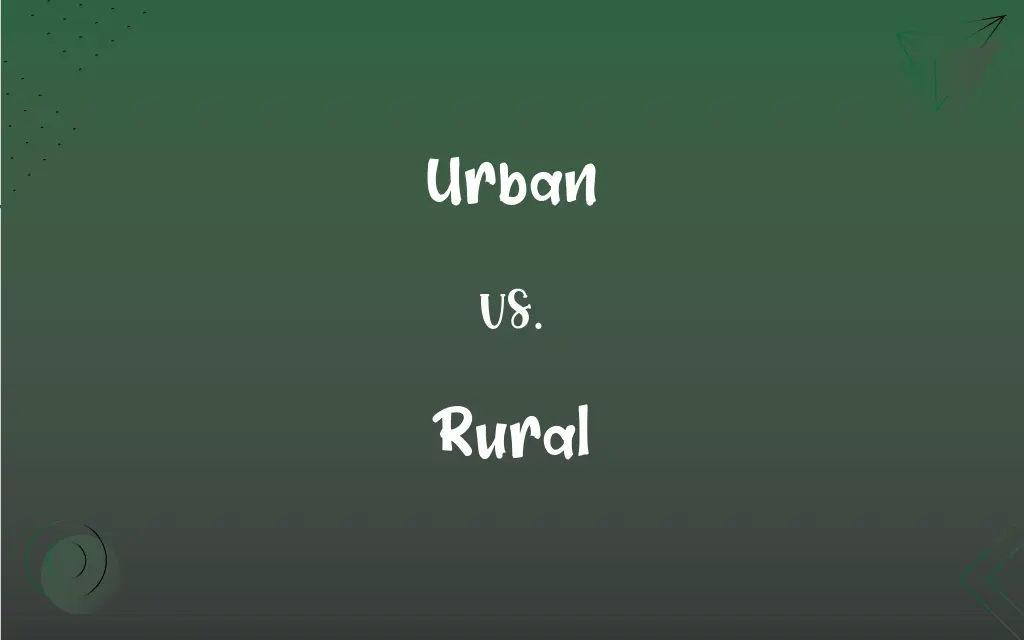Urban vs. Rural: What's the Difference?
Edited by Aimie Carlson || By Harlon Moss || Updated on May 31, 2024
Urban relates to cities or towns, characterized by high population density and vast human features in contrast to the area surrounding it, while rural pertains to the countryside, often marked by low population density, with more open space .

Key Differences
Urban areas typically exhibit a bustling environment, densely populated with an array of structures and facilities. The term "urban" is often associated with cities and towns where complex societal structures, businesses, and cultural activities converge. Rural, on the other hand, paints a picture of more tranquil, sparsely populated areas. When describing “rural,” one often refers to the countryside, where there is an abundance of open space and natural elements, such as forests and fields.
In an urban context, economies often pivot on a diverse assortment of industries, including technology, finance, and service sectors. Urban locales tend to host various institutions of education, hospitals, and businesses, offering numerous opportunities for education and employment. Rural areas, conversely, might showcase an economy profoundly rooted in agriculture and primary sector activities. Rural environs often nurture close-knit communities, where people tend to have interpersonal relationships and share common cultural and social ties.
Urban life is often deemed fast-paced, with a palpable energy and myriad of activities always in motion. This liveliness results from the abundance of people, jobs, and events that cities naturally host. Conversely, rural areas often champion a slower, more relaxed pace of life, where the environment and traditions sculpt the rhythms of daily existence, providing a stark contrast to the ever-moving urban life.
Comparison Chart
Population Density
High
Low
Infrastructure
Highly developed
Limited/developed
ADVERTISEMENT
Primary Economy Type
Diverse industries
Often agricultural
Lifestyle
Fast-paced
Relaxed, slow-paced
Environment
Man-made structures
Natural landscapes
Urban and Rural Definitions
Urban
In an urban context, societal functions and resources are densely concentrated.
Urban residents often have better access to healthcare and educational facilities.
Rural
Rural typically refers to regions outside cities and towns, often associated with the countryside.
The rural landscape was dotted with farms and small homesteads.
ADVERTISEMENT
Urban
Urban usually encompasses a variety of cultural, social, and recreational activities.
Urban dwellers have diverse options for nightlife and entertainment.
Rural
Rural can denote regions where amenities and facilities might be limited or distant.
In some rural areas, residents have to travel miles to reach a hospital.
Urban
Urban refers to areas characterized by high human population and vast infrastructure.
The urban landscape was lit with countless lights from numerous buildings.
Rural
Rural areas often possess a lower population density compared to urban regions.
They enjoyed the peace and quiet of rural living.
Urban
Urban can denote regions where a majority of people are not engaged in agriculture.
She moved to an urban area to find employment in the tech industry.
Rural
The term rural may evoke notions of close-knit communities and traditional lifestyles.
Rural villagers often come together for communal events and festivals.
Urban
The word urban can imply areas where public services are readily available.
Urban areas tend to have robust public transport systems.
Rural
When describing an area as rural, it might suggest a significant engagement in agricultural activities.
Rural communities often rely heavily on farming and agriculture.
Urban
Of, relating to, or located in a city.
Rural
Of, relating to, or characteristic of the country.
Urban
Characteristic of the city or city life.
Rural
Of or relating to people who live in the country
Rural households.
Urban
Related to the (or any) city.
Urban life
Urban traffic
Rural
Of or relating to farming; agricultural.
Urban
Characteristic of city life.
Rural
Relating to the countryside or to agriculture.
Urban
Relating to contemporary African American culture, especially in music.
Rural
(obsolete) A person from the countryside; a rustic.
Urban
(of inhabitants or residents) Black; African American.
Rural
Of or pertaining to the country, as distinguished from a city or town; living in the country; suitable for, or resembling, the country; rustic; as, rural scenes; a rural prospect.
Here is a rural fellow; . . . He brings you figs.
Urban
Of or belonging to a city or town; as, an urban population.
Rural
Of or pertaining to agriculture; as, rural economy.
We turnTo where the silver Thames first rural grows.
Lay bashfulness, that rustic virtue, by;To manly confidence thy throughts apply.
Urban
Belonging to, or suiting, those living in a city; cultivated; polite; urbane; as, urban manners.
Rural
Living in or characteristic of farming or country life;
Rural people
Large rural households
Unpaved rural roads
An economy that is basically rural
Urban
Relating to or concerned with a city or densely populated area;
Urban sociology
Urban development
Rural
Relating to rural areas;
Rural electrification
Rural free delivery (RFD)
Urban
Located in or characteristic of a city or city life;
Urban property owners
Urban affairs
Urban manners
FAQs
What defines an urban area?
An urban area is defined by high population density and vast man-made structures, often with developed infrastructure, and a diverse economic structure.
How is rural life typically characterized?
Rural life is usually characterized by lower population density, potentially agriculture-based economies, and a close-knit community, often with more natural surroundings.
Why do people often migrate from rural to urban areas?
People often migrate from rural to urban areas in search of better employment opportunities, education, healthcare, and other amenities.
Are urban areas more technologically advanced than rural areas?
Generally, yes. Urban areas often have better access to advanced technologies and faster internet connectivity compared to rural areas.
Are social ties stronger in rural or urban areas?
While it can depend on the specific locale and individuals, social ties are often perceived to be stronger and more community-oriented in rural areas.
What's the main allure of urban living?
Urban living often allures people with its wide array of opportunities, amenities, and diverse social, cultural, and recreational activities.
How do transportation options typically vary between urban and rural environments?
Urban areas usually offer various public transport options, like buses, subways, and taxis, whereas rural areas might have limited or no public transportation.
What are the typical entertainment options in urban areas?
Urban areas usually feature various entertainment options like theaters, malls, restaurants, parks, and cultural festivals.
What might be a challenge for education in rural areas?
Rural areas might face challenges like limited access to educational resources, fewer schools, and potentially, less-qualified teaching staff.
How do living costs compare between urban and rural areas?
Living costs in urban areas are generally higher due to increased prices for housing, food, transportation, and other services compared to rural areas.
How do health facilities generally compare between urban and rural settings?
Urban areas typically have better access to advanced healthcare facilities, while rural areas may have limited resources and fewer specialty services.
Is agriculture a dominant sector in rural areas?
Yes, agriculture is often a dominant sector in rural areas, although other activities like small-scale manufacturing can also be prevalent.
Can rural areas offer advantages over urban living?
Yes, rural areas might offer a quieter, slower-paced life, potentially with a closer community and a more direct connection to nature.
What is "urbanization"?
Urbanization refers to the increasing population in urban areas, often due to migration from rural regions and the growth of infrastructural developments.
Can rural areas be commercially developed?
Yes, rural areas can be commercially developed, often through the introduction of businesses, tourism, or converting agricultural activities into commercial ventures.
Which area, urban or rural, tends to have larger living spaces for inhabitants?
Rural areas tend to offer larger living spaces as compared to the often-cramped living conditions found in urban environments.
Can urban and rural areas coexist and complement each other?
Yes, urban and rural areas can coexist and complement each other, often through the exchange of resources, like agricultural produce from rural to urban areas and technological advancements from urban to rural areas.
What types of jobs are commonly found in urban areas?
Urban areas typically offer a wide array of jobs, including those in industries like finance, technology, healthcare, and services.
Is pollution typically higher in urban or rural areas?
Pollution is generally higher in urban areas due to factors like vehicular emissions, industrial activities, and higher population densities.
What are some challenges of urban living?
Challenges of urban living may include dealing with congestion, noise, higher costs of living, and often, reduced personal space.
About Author
Written by
Harlon MossHarlon is a seasoned quality moderator and accomplished content writer for Difference Wiki. An alumnus of the prestigious University of California, he earned his degree in Computer Science. Leveraging his academic background, Harlon brings a meticulous and informed perspective to his work, ensuring content accuracy and excellence.
Edited by
Aimie CarlsonAimie Carlson, holding a master's degree in English literature, is a fervent English language enthusiast. She lends her writing talents to Difference Wiki, a prominent website that specializes in comparisons, offering readers insightful analyses that both captivate and inform.































































